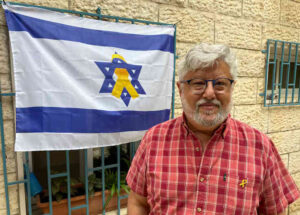The people of Israel need to
“own up to the reality”
that the October 7 attacks happened because of their own security failures, the country’s leading peace negotiator has told The National.
Gershon Baskin, who played a key role in the release of Israeli army hostage Gilad Shalit in 2011, has also put forward a peace plan for Gaza that he claims has been agreed by Hamas.
But the political activist, who is possibly the best connected Israeli to Hamas, says Prime Minister Benjamin Netanyahu torpedoed the proposal for unexplained reasons.
As the first anniversary of war approaches, Mr Baskin is uncompromising on how Israel needs to accept responsibility for its failings and the subsequent bloodshed in Gaza and beyond.
Israel’s strikes and ground offensive in Gaza have killed almost 41,700 people, injured tens of thousands and left most of the population displaced. This followed a Hamas-led attack on southern Israeli communities on October 7, in which about 1,200 people were killed and 240 abducted.
“I remind Israelis whenever they say, ‘but what about October 7?’ I tell them, ‘let’s own up to reality, October 7 happened because the Israeli army wasn’t there.”
People had to understand that Israel was “not facing the Russian army” in Hamas, and if on the day their military had deployed “just 15 tanks on the ground and three helicopters in the air” the attack would not have happened,
said Mr Baskin.
“It’s not like we have to reoccupy Gaza to protect ourselves from another October 7,” he said. “Let’s be real, if the army is on the border, it can’t happen again.”
But Israelis also had to understand that the attack was the culmination of decades of Israeli-Palestinian conflict.
“It blew up in our face,” said Mr Baskin. “You cannot ignore it. You cannot sweep it under the rug.”
He said it was remarkable that the two-state solution was now back on the table, after everyone “thought it was dead”. When the war finally ends, said Mr Baskin, there will remain
“seven million Palestinian Arabs and seven million Israeli Jews between the Jordan River and the Mediterranean Sea”.
For peace to be sustainable “we have to figure out how we’re going to live together and that we have no interest in killing more Palestinians, that they’re our neighbours”.
Three-week peace plan
Mr Baskin, who is in regular contact with lead Hamas negotiator Ghazi Hamad, says that Hamas has accepted a “three-week peace plan” in which they have agreed to transfer governance to a “professional, technocratic government responsible for all – including security”.
At the request of the families of the 101 hostages still held by Hamas, he explored a possible agreement to improve on the “bad deal” put forward by Israel and the US in May.
Mr Baskin asked Mr Hamad if Hamas would end the war in three weeks, with an Israeli withdrawal from Gaza, Palestinian prisoners released and hostages returned.
“After three days’ consultation, Ghazi Hamad came back to me and said, ‘yes, we accept’. I asked, ‘the whole leadership?’ He said, ‘yes, the whole leadership,’”
intimating that Hamas leader Yahya Sinwar was in agreement.
US officials wanted to know if Hamas would give up power, and Mr Hamad responded, through the negotiator, that they would transfer governance to a Palestinian body.
Asked about internal security and the weapons, Hamas stated that they were willing to turn these over to the new government.
“They were willing to give up quite a lot,”
said Mr Baskin.
He asked the Americans to get clarification from Qatari and Egyptian negotiators, as Hamas said “it won’t go public with it, because it weakens our position”.
Mr Baskin says an Israeli negotiator later told him Prime Minster Benjamin Netanyahu “did want to end the war”. It appeared that the Israeli leader had determined that defeating Hezbollah and invading southern Lebanon took precedence, he suggested.
“Here’s a deal, which even Netanyahu can present as a win,”
said Mr Baskin, speaking at his home in Jerusalem. “It ends the war. There’s a new government of Gaza and the hostages come home. How is that a lose for Netanyahu?”
Backchannels with Hamas
This conviction to achieve peace, and his credibility to articulate it, are born from Mr Baskin’s personal dealings in the conflict.
His connections with Hamas began when two decades ago, he met a Palestinian professor from Gaza who was fascinated by him – having never met an Israeli before.
This led Mr Baskin to meeting Ghazi Hamad and it was this connection that was used when his wife’s cousin was kidnapped by extremists and he was asked to intervene. Sadly, it was too late to save the man who was murdered just before he could be rescued.
But Mr Baskin had established a connection, and when Gilad Shalit was captured in 2006 and taken into captivity in Gaza, he was called by the Hamas negotiator.
Torturous talks began, with Mr Baskin eventually obtaining a proof-of-life letter written by the Israeli soldier, 50 days after his abduction.
The Israeli government then secretly entered into deal-making that took five years before Mr Shalit was released in exchange for 1,027 Palestinian prisoners in 2011.
To the horror of some of Mr Baskin’s relatives, they included four men who had killed his wife’s cousin.
On the day of their release Mr Baskin called the man’s widow. “She screamed at me for almost an hour,” he said. “But what she said on the phone, I broke down in tears … ‘Gershon, my husband isn’t coming home, but the people who killed him are.’”
His response was that at least one Israeli life had been saved as a result, but she has never spoken to him since.
Grateful for Mr Baskin’s role in his release, Mr Shalit invited him to his wedding, where no politician was present.
While the pair have occasional communication, Mr Baskin knows that “me being in contact with him is just a reminder of his past, so I minimise it”.
Among those freed was Mr Sinwar, who despite being a senior Hamas figure, was not thought by the Israeli security to be so dangerous to them because he was serving four life sentences for killing Palestinian collaborators, not Israelis.
For 18 years Mr Baskin has engaged in speaking to Hamas, which is proscribed by Israel as a terrorist group. Despite this, the authorities have let him be.
“In Israel it is illegal to talk to the enemy, but I’ve been doing it for 18 years and no one has arrested me,”
he said with a smile.
Originally Published by The National at
https://www.thenationalnews.com/news/uk/2024/10/03/israel-gaza-ceasefire-hostages/



